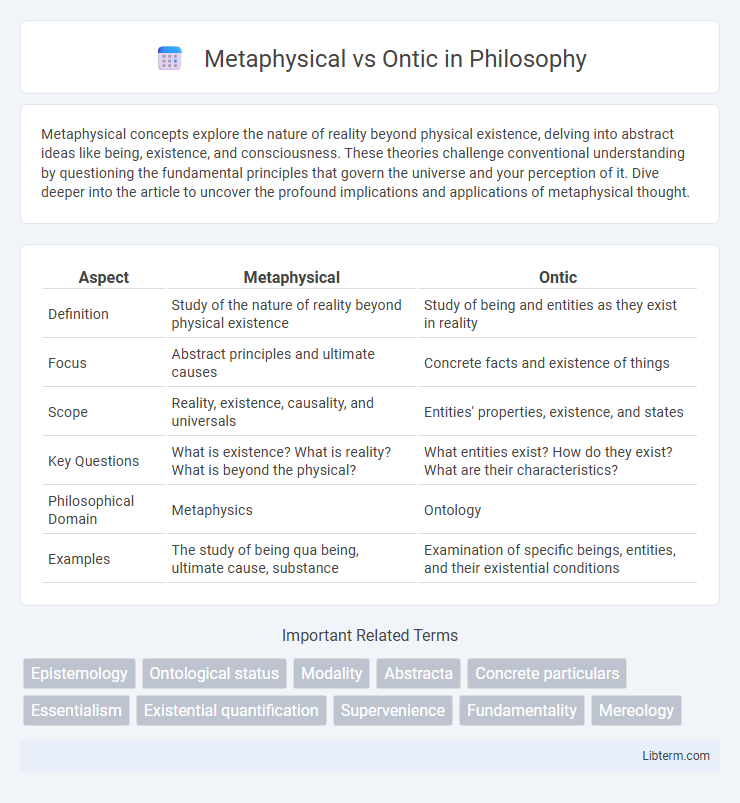Metaphysical concepts explore the nature of reality beyond physical existence, delving into abstract ideas like being, existence, and consciousness. These theories challenge conventional understanding by questioning the fundamental principles that govern the universe and your perception of it. Dive deeper into the article to uncover the profound implications and applications of metaphysical thought.
Table of Comparison
| Aspect | Metaphysical | Ontic |
|---|---|---|
| Definition | Study of the nature of reality beyond physical existence | Study of being and entities as they exist in reality |
| Focus | Abstract principles and ultimate causes | Concrete facts and existence of things |
| Scope | Reality, existence, causality, and universals | Entities' properties, existence, and states |
| Key Questions | What is existence? What is reality? What is beyond the physical? | What entities exist? How do they exist? What are their characteristics? |
| Philosophical Domain | Metaphysics | Ontology |
| Examples | The study of being qua being, ultimate cause, substance | Examination of specific beings, entities, and their existential conditions |
Introduction: Defining Metaphysical and Ontic
Metaphysical pertains to the study of existence, reality, and the fundamental nature of being beyond the physical world, addressing concepts such as causality, identity, and the nature of objects. Ontic relates specifically to the concrete, factual aspects of entities and their individual existence within reality, focusing on what actually *is*. Defining metaphysical involves exploring abstract principles and universal truths, whereas ontic centers on particular, tangible facts and real entities.
Historical Origins of Metaphysical and Ontic Concepts
The concepts of metaphysical and ontic originate from ancient Greek philosophy, with metaphysics tracing back to Aristotle's works titled "Metaphysics," exploring the nature of reality beyond the physical world. Ontic, derived from the Greek word "ontikos," refers to the study of being or existence as such, focusing on concrete entities and factual existence. Historically, metaphysical inquiry delves into the fundamental principles underlying reality, while ontic analysis concentrates on specific actual entities within that reality.
Core Principles of Metaphysics
Metaphysics explores the fundamental nature of reality, focusing on concepts like existence, causality, and the nature of being, while ontology, a branch of metaphysics, specifically examines the categories of being and their relations. Core principles of metaphysics include the study of substance, identity, time, space, and possibility, aiming to uncover the underlying structure that governs all entities. These principles guide inquiries into what it means for something to exist and how entities relate within the broader framework of reality.
The Nature of Ontic Reality
Ontic reality refers to the concrete existence of entities and facts independent of perception or interpretation, emphasizing what must exist for things to be. It is concerned with the actual states of affairs and objects that instantiate properties, as opposed to metaphysical questions about the fundamental nature or essence underlying those entities. Understanding ontic reality involves examining how particular objects and their relations constitute the fabric of existence, grounded in empirical or factual conditions rather than abstract speculative frameworks.
Key Differences between Metaphysical and Ontic Perspectives
Metaphysical perspectives explore the fundamental nature of reality, addressing questions about existence, being, and the universe beyond physical phenomena. Ontic perspectives concentrate specifically on the nature of entities and their concrete properties, focusing on what exists in the material world. Key differences lie in metaphysics' abstract, foundational inquiry versus ontology's concrete analysis of actual beings and their states.
Philosophical Theories Supporting Metaphysical and Ontic Distinctions
Philosophical theories such as Heidegger's fundamental ontology and Aquinas's metaphysics highlight distinctions between metaphysical and ontic realities by emphasizing the nature of being versus particular entities. Heidegger differentiates between ontic inquiry, which examines specific beings, and metaphysical inquiry, which explores being as such, supporting a layered analysis of existence. Thomistic metaphysics underlines essence and existence, reinforcing the ontic as individual beings while metaphysics addresses the underlying principles and causes.
Practical Implications in Science and Philosophy
Metaphysical inquiries explore the fundamental nature of reality, addressing concepts like existence and causality, while ontic analysis concentrates on the actual entities that constitute reality. In science, ontic perspectives guide empirical investigations by focusing on observable phenomena, whereas metaphysical considerations inform the theoretical frameworks underpinning scientific models. Philosophical discourse leverages the distinction to clarify debates on the essence of being versus the existence of specific entities, influencing interpretations in ontology and epistemology.
Debates and Controversies: Metaphysical vs Ontic
Debates between metaphysical and ontic perspectives center on the nature of existence and reality, questioning whether fundamental truths lie in abstract principles or concrete entities. Controversies arise over the primacy of metaphysical frameworks versus ontic particulars, influencing interpretations in philosophy of science, especially regarding the status of theoretical entities and structures. These disputes shape ongoing discussions on how to accurately describe the world--through universal metaphysical categories or through the concrete, ontic fabric of reality itself.
Real-World Examples of Metaphysical and Ontic Applications
Metaphysical concepts often arise in disciplines like philosophy and theology, where questions about existence, being, and reality are explored, such as debates on the nature of consciousness or the existence of free will. Ontic applications are prevalent in science and empirical research, focusing on concrete properties and states of entities, exemplified by studying the chemical composition of materials or the behavior of physical objects under certain conditions. Real-world examples include metaphysical discussions on the essence of identity in artificial intelligence ethics, while ontic concerns drive practical advancements in medical diagnostics through analyzing tangible biological markers.
Conclusion: Bridging Metaphysical and Ontic Understanding
Bridging metaphysical and ontic understanding enriches the comprehension of reality by integrating abstract principles with concrete existence. This synthesis enables a holistic framework where metaphysical concepts inform ontic observations, enhancing clarity in philosophical and scientific inquiries. Emphasizing their interdependence fosters deeper insights into being and existence beyond isolated perspectives.
Metaphysical Infographic

 libterm.com
libterm.com